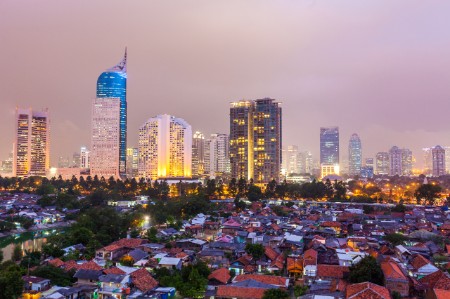Meanwhile, corporate governance is not as strong as it could be. Indonesia ranks last out of 11 Asian markets in the Asian Corporate Governance Association’s most recent Corporate Governance Watch survey, issued in 2016; while reforms have been introduced, some commentators have suggested that they are not being implemented speedily enough.
Key sectors have been under pressure in an economy that is highly correlated with commodity price trends. Retail is one such sector and is strategically important, given that consumption accounts for more than half of the country’s economic growth. Official data shows household consumption growing at a slower pace compared to previous years (at just under 5% in 2017). As a result, some international retailers have been forced to shut down operations in Indonesia.
This ties back to broader drivers shaping the Indonesian retail landscape. “We are witnessing shifts in consumer spending patterns toward leisure, entertainment and education. Because of that, the fast-moving consumer goods (FMCG) segment is under pressure,” says Tevilyan Yudhistira Rusli, CFO at Unilever Indonesia. The global consumer giant has long roots in Indonesia, with a market presence dating back 84 years.
There is an expectation that, once this year’s provincial elections and the 2019 general election are out of the way, consumer spending will strengthen as the prevailing caution dispels. In any case, says Yudhistira, “the consumption per capital ratio is still one of the lowest relative to neighboring countries. Market penetration of products such as deodorant, at 35-40%, is still low. That makes the market very promising over the long term.”
The competitive landscape is also transforming. Large companies are facing competition from smaller, nimble market entrants that are able to outsource R&D. These companies are also tapping into more national-focused brand loyalties. “Consumer thinking is, why choose a global brand when I could choose an Indonesian one?” says Yudhistira. He adds that, for large companies, trying to be nimble is the best way forward, but it is like an elephant trying to dance – “easier said than done.”
Opportunities for financial services
Indonesia’s insurance and financial services market is another area that offers substantial growth opportunities. Figures from the Indonesian Life Insurance Association reveal that just 17.7 million Indonesians were insured in the second quarter of 2017. Premiums underwritten represent only 1.3% of the country’s GDP.
“The key point about the Indonesian insurance market is that penetration rates are exceptionally low,” says Prudential’s Nick Holder. “That means there are great opportunities to increase sales.”
One of the Government’s big initiatives of recent years has been to create a form of universal health service called Jaminan Kesehatan Nasional (JKN). This helped people to get medical treatment, and JKN now covers 190 million people. According to Holder, it has also helped move healthcare up the agenda in terms of individual decision-making agendas. If anything, this has increased individual demand for private medical insurance.
Anti-corruption commitments
Much of Indonesia’s focus this year will be absorbed by the electoral cycle. Simultaneous elections will take place in 171 regions, including 17 provinces, in June, followed by campaigning for the presidential elections that are set for 2019. However, the Government will also be looking to boost its reform program.
The International Monetary Fund delivered an assessment of Indonesia’s economy in February 2018. It urged the Government to adopt a fiscal-structural reform package that mobilizes revenues to finance development spending and supports structural reforms in the product, labor and financial markets.
It already has a head start. The Indonesian Government has launched 15 policy packages on structural reforms since 2015 and repealed more than 3,000 regulations that hampered investment. One of Jokowi’s priorities when he became president was to introduce a Tax Amnesty Program, an important instrument to ensure that the Government receives tax revenue it can use to pay for infrastructure projects.
Another key focus for the administration has been to deliver on anti-corruption commitments. There is a drive to punish those who are deemed not to be playing by the rules, and more actions are being taken against those found to be guilty of committing acts of corruption.
Bill Hayton, an Associate Fellow at think tank Chatham House’s Asia-Pacific program, says: “Clearly, the authorities are trying to reform the economy and simplify things, such as reducing some of the controlled sectors. There are still industries where foreigners can’t invest, but these are diminishing.” By way of example, he points to some investor concerns about a reviving resource nationalism that has affected hydrocarbons and minerals sectors.
Rainer Heufers, Executive Director of the Center for Indonesian Policy Studies in Jakarta, highlights efforts to make it easier to set up and run businesses. “President Jokowi is adamant about the need to achieve better rankings in the World Bank’s Ease of Doing Business index,” he says. “These are small steps rather than huge reforms, but they do improve things little by little.” For example, he notes an improvement in the operations of the Indonesia Investment Coordinating Board. “It may not yet be where we want it to be, but it has improved over the years and that is important for foreign investors.”
Unilever’s Yudhistira highlights the liberal nature of the foreign investment regime, allowing 100% foreign ownership. But he cautions that in some sectors – such as FMCG – if you are wholly foreign-owned, you may be restricted from direct access to the market. “If you are in a joint venture with minority local shareholders, you can sell direct to department stores, but if you are 100% foreign-owned, you need to have local distributors to get you into the store,” he explains.
For businesses considering the Indonesian market, it is crucial to have the right partner, says Heufers. “The market still plays by its own rules. There are regulatory hurdles but also cultural communication ones, so you need to have a very good local partner who understands how to maneuver here. That’s important if you are coming in with a sizable business. Trying your own luck in this market is difficult.”


